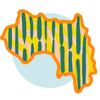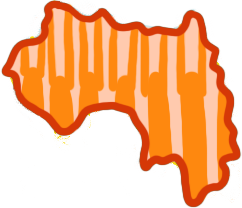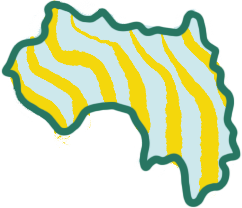Text
Up until now, we've learned a lot of different constructions that allow you to say a bunch of things about yourself as well as the people and things around you. But we haven't explicitly taken any time to dig into the words used to form questions.
In this chapter, I'll cover the following:
- using intonation to form questions
- the general yes-no question marker
ba - the question words equivalent to "who", "when", "what", "where", "how" PLUS "which" and "how many/much"
Intonation
The simplest way to ask a yes-no question in Maninka, and in Manding in general, is to simply change one's intonation to a rising one.
For instance, let's say your friend Adama was over to visit. When it was time for him to go, you might announce to your mom and dad:
Adama ye wala.
'Adama goes/is going.'
On the other hand, if your mom and dad noticed that Adama was getting his things together, they might ask the same thing, but with a rising intonation at the end of the sentence:
Adama ye wala? ⬆
'Adama is going?''
This can also apply to other kinds of sentences. For instance, a qualitative verb construction:
Adama ka kɛndɛ? ⬆
'Is Adama healthy?'
Or a presentative sentence:
Mɔbili le? ⬆
'Is it a car?'
Question marker ba
To formally mark a yes-no sentence as a question, you just need one word: ba. For instance, if take our example from before, we could say something like:
Adama ye wala ba?
'Is Adama going?'
Notice, in this case, that the word ba does the work of what in English is done by inverting the word order: instead of "Adama is going?", we say "Is Adama going?" In Maninka, you don't need to make any change in word order.
We can add ba to any yes-no question. For instance, if a political leader appeared on television saying nonsense, you and a friend might have an exchange like follows:
– Fatɔ le ba?
– Ɔnhɔn, fatɔ le.– Is it/he a crazy person?
– Yes, it/he is a crazy person.
(NOTE: Just a heads-up: in Bambara/Jula, the equivalent of ba as question marker iswa. Do not be surprised if you run into this form in border areas or with Maninka speakers with personal connections to Mali or Côte d'Ivoire, etc.)
Formal question words
If you want to ask questions that can't be answered with a simple "yes" or "no" then you need to learn the formal question words that are equivalent to things like "who", "what", "when", etc. Here, I will give them to you one-by-one in no particular order via examples using basic grammar that we've already covered.
jɔn 'who'
Let's start with jɔn ('who') and take an example like one that we had in an earlier chapter.
If someone knocks at your door, you might call out:
Jɔn ne?
who it.is'Who is it?'
And your friend could answer:
Musa le
Musa it.is'It's Musa'
This first example highlights something important. In Maninka, formal question words (sometimes called "wh-question" words by English-speaking linguists) always appear in the same location as the word that they replace. There's no need to switch things around like in English when we say "Who is it?" but answer with "It is Musa."
mun 'what'
Next, we have mun ('what').
If you and a friend stopped at a food stand for a little refreshment, they might ask you:
I ye mun damunna?
'What do you eat?'
(as in, 'What will you have?')
And you could answer:
N ye kini damunna
'I eat (cooked) rice'
min 'where'
Next, we have min ('where').
For instance, if you were getting ready to ride into town, a friend might ask:
I la nɛɛso ye min?
'Where is your bike?'
And you could answer:
À ye kɛndɛ ma
'It is outside'
(
kɛndɛ mais a two-word expression used to express the idea of 'outside'; literally, it means something close to 'towards the clearing/daylight')
di 'how'
Next, we have di ('how').
For instance, if you told a friend you were going into town, they might ask:
I ye wala di?
'How are you going?'
(lit. 'You are going how?')
Or they might use a common equivalent, ɲa di, which combines di with the noun ɲa ('manner; way'):
I ye wala ɲa di?
'How are you going?'
(lit. 'You are going manner how?')
In either case, you could answer:
N ye wala nɛɛso la
'I am going on bike'
(as in, 'I am going by bike')
(NOTE: A common Bambara/Jula synonym of ɲa is cogo [Cogo di? 'How?']. In Maninka, it takes the form coo.)
jeli 'how many/much'
Next, we have jeli ('how many/much').
For instance, if you were playing soccer with some friends and needed to divide yourselves up into teams, you might ask:
An ye mɔɔ jeli di?
'How many people are we?'
(lit. 'We are how many people?')
And your friend might tell you:
An ye mɔɔ seyi di
'We are eight people'
(as in, 'There are eight of us')
(NOTE: The Bambara/Jula equivalent of jeli is joli.)
juman / ɲiman 'which'
Next, we have juman ('which').
For instance, if on a hot day, your friend surprised you and brought out some cold drinks, they might ask you:
I di juman ta?
'You will take which?'
(as in, 'Which one do you want to have?')
And you, naturally, would answer:
N di ɲamankuji ta
'I take the ginger-juice'
(as in, 'I'll have the ginger-juice')
In some Maninka areas, people prefer to use the form ɲiman (which is sometimes pronounced ɲuman) in place of juman. For instance:
I di ɲiman ta?
'You will take which?''
My recommendation is to go with juman for starters since it is the same as what is used in Bambara/Jula. But if you notice people that you might using ɲiman, go ahead and switch!
tuma juman 'when'
Finally, we've got the expression tuma juman, which literally means 'which time', and is the typical way of expressing the English question-word of 'when'.
For instance, if you weren't getting along with a friend too well, but they wanted to make amends, they might ask:
An di kuma tuma juman?
'We will talk when?'
(as in, 'When shall we talk?')
And you, of course, since you are sad about having temporarily lost a friend, could say:
An di kuma sini
'We will talk tomorrow'
(as in, 'We'll talk tomorrow)
As you might have guessed, you can easily create the same meaning by switching juman our for its synonym word for 'which' ɲiman:
An di kuma tuma ɲiman?
'We will talk when?'
munna 'why'
And then, as a bonus, there's the question word munna, which literally means 'on what' (< mun + na 'what + on') and is the typical way of expressing 'why'.
For instance, if you had just finished a trip to Guinea and were getting ready to leave, one of your new friends might ask:
I ye wala munna?
you PRESENT go why'Why are you going?'
There are a lot of different words and expressions that are used as equivalents of the 'because'. One of simplest and most common is bawo:
N ye wala bawo n ye lonlan di
'I am going because I am a foreigner/guest'
Summary
Ayiwa! We covered the following:
-
Yes/no questions can be formulated by adding a rising intonation the end of a sentence just like in English.
-
Yes/no questions can also be made using the question marker word
waat the end of a sentence. For instance:I ka kɛndɛ ba?
'Are you healthy?'
-
Formal question words
jɔn,mun,min,(ɲa) di,jeli,jumanandtuman jumantake the exact place of the noun that they replace. For instance:– I ye bɔla min?
– N ye bɔla Laginɛ.– Where are you from?
– I am from Guinea. -
The question words
juman('which') andjeli('how many/much') appear after the noun. For instance:– I ye kan juman fɔla?
–N ye tubabukan fɔla.– Which language do you speak?
– I speak French.
Vocab
Coming soon n'Ala sɔnna!
- ba
- yes/no question marker [Maninka]
- wa
- yes/no question marker [Bambara]
- jɔn
- who
- min
- where
- mun
- what
- di
- how
- ɲa
- manner
- ɲa di
- how (lit. "manner how")
- juman/ɲiman/ɲuman
- which
- jumannu/ɲimannu/ɲumannu
- which [plural]
- jeli
- how many/much
- tuma juman/ɲiman
- when (lit. 'which time')
- munna / mun dɔ
- why (lit. 'on what' / 'in what')
- mun kosɔn
- why; because of what
- mun kanma/kama
- why; what for
- bawo
- because
- sisɛn-sisɛn / ten-ten
- right now
- lon
- day
- lɔɔkun
- week/market cycle
- karo
- month
- san
- year
- ɲinan
- this year
- saron
- last year
- malo
- rice [typically Maninka]
- kini
- (cooked) rice [typically Bambara]
- k'à ta
- to take something
- ɲamakuji
- ginger juice
- konko
- the bush; the wilderness
- fodo
- (farming) field
- sanmakulun
- airplane
- lonlan
- foreigner; guest
- jatii/jetii
- host
Vocab list will be here someday!
Flashcards will be here someday!
Exercises
Exercises will be here someday!




